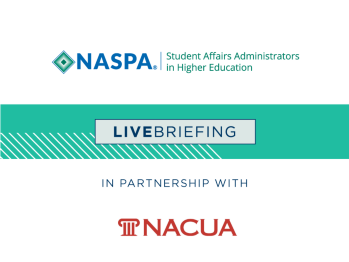
COVID-19 In-Person or Virtual Requests for Accommodations: What You Need to Know
Virtual Live Briefings Supporting the Profession Disability Knowledge Community Senior Level VP for Student Affairs
August 25, 2020 12:00PM ET-2:00PM ET
In partnership with NACUA, this two-hour webinar will focus on how institutions of higher education can best assess and address the likely types of COVID-19 related disability accommodation requests they will receive this fall upon a return to instruction. The webinar presenters will examine relevant legal principles and offer practical solutions for campuses as they work to provide accessible and safe learning and working environments when they reopen.
Presented By

About
Colleges and universities have announced their reopening plans for the fall. Whether institutions plan to resume in-person instruction, offer only online instruction, or hybrid models combining the two, they will have to determine how best to accommodate faculty, staff, and students who request accommodations under federal and other disability laws. While many institutions have well-established policies and procedures for such requests, the coronavirus has introduced a number of novel issues with which they will have to grapple as they strive to maintain accessible, healthy learning environments where members of the campus community feel safe.
For example, faculty members may request accommodations to virtually teach due to a fear of contracting coronavirus—but does this type of anxiety qualify as a “disability” under the ADA? Does the analysis change if the faculty member is 60 years or older and/or has an underlying condition that could lead to an increased risk of severe illness from the disease? Similarly, students who fear contracting the virus may request single room housing accommodations or modifications to clinical training programs traditionally performed in-person. In addition to these types of requests, institutions offering some or much of their instruction online will need to ensure that students maintain equal access in an online learning environment. Moreover, how will colleges and universities handle accommodation requests which might conflict with recommended public health guidelines (e.g., requests to not wear masks or other personal protective equipment)?
This two-hour webinar will focus on how institutions of higher education can best assess and address the likely types of COVID-19 related disability accommodation requests they will receive this fall upon a return to instruction. The webinar presenters will examine relevant legal principles and offer practical solutions for campuses as they work to provide accessible and safe learning and working environments when they reopen.
Who Should Attend?
This webinar will be of interest to attorneys who advise institutions on COVID-19-related issues and counsel or other administrators involved in coronavirus or return-to-instruction task forces or committees as well as attorneys who advise colleges and universities on accessibility and disability related issues and administrators or other personnel involved in accessibility and disability services.
Schedule
12:00 P.M. ET
I. Introduction
II. Assessing COVID-19 Related Accommodation Requests
a. Fear of Contracting Coronavirus
b. Persons with Characteristics Contributing to an Increased Risk of Severe Illness
II. Student Accommodations
a. Academic Accommodations
b. Housing Accommodations
III. Employee Accommodations
IV. Accommodations Conflicting with Public Health Guidelines
2:00 P.M. ET
VI. Conclusion
Speakers
Paige Barnett is an Assistant General Counsel in the General Law Section of the Office of General Counsel, and she specializes in employment law, student affairs, and other policy matters.
Prior to joining UT System in October 2015, Ms. Barnett practiced employment law for more than 10 years at the Chicago firm Vedder Price P.C. where she represented a wide range of public- and private-sector employers in a variety of traditional labor and employment law matters. At Vedder Price, Ms. Barnett litigated civil cases involving federal and state anti-discrimination laws and employment-related torts before federal and state courts and administrative agencies. She also advised clients on day-to-day employment law issues. When Ms. Barnett returned to her home state of Texas in 2012, she worked as a human resources consultant, conducting internal investigations and employee training.
As a member of the Education Team and Labor, Employment and Benefits Group at Holland & Knight, Jeff Nolan works with clients throughout the United States regarding situations that implicate Title IX, the Clery Act, the ADA, and other laws that apply in the higher education context. Jeff conducts compliance assessments, helps clients develop appropriate policies, practices and training programs, and provides training to investigators, hearing panel members, and other professionals. Jeff also advises clients on threat assessment practices, helps clients create appropriate violence prevention policies, and conducts independent investigations of sensitive campus and workplace issues. Jeff also represents clients in federal and state courts and before administrative agencies.
Jeff has presented for NACUA many times on Title IX/Clery Act, threat assessment, ADA, employment law and other issues, and has authored or co-authored three NACUANOTEs on issues related to fair, trauma-informed sexual assault investigations, emotional support animals, and developments in the law related to transgender individuals. In 2018 and 2019, Jeff served on a working group that developed the American Council on Education's comments to the Department of Education regarding the November, 2018 proposed Title IX regulations.
Registration
Registration for NACUA Members and *Non-Members is $265.00.